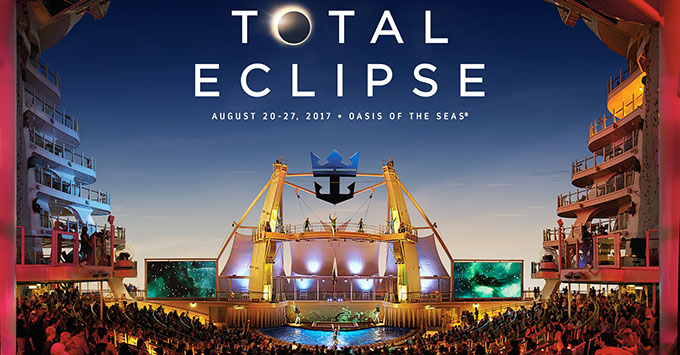— Looking to add something to your bucket list that will set you apart from the pack? Royal Caribbean just might have the answer, with its Total Eclipse Cruise. The sailing will give passengers onboard Oasis of the Seas on August 21 the perfect viewpoint to witness the “Great American Eclipse,” while also attending a viewing party concert of a yet-unnamed major headline act.
The total solar eclipse, being referred to in the media as the Great American Eclipse, will be the first visible from the United States since 1991, an eclipse that could be seen only from parts of Hawaii. The last total solar eclipse visible to people from the continental U.S. was in 1979 but the path of that eclipse passed only through five states.
“We’re set to take vacationers on an unprecedented experience that is nearly a century in the making,” said Michael Bayley, president and CEO of Royal Caribbean International. “A total solar eclipse hasn’t crossed the entire U.S. since 1918, and with many of our ships sailing to the Caribbean along the projected path, the stars aligned. Oasis of the Seas will have the vantage point of the century.”
The seven-night sailing, which departs August 20 from Port Canaveral, will include a slate of eclipse-themed activities including dance parties, trivia, lectures, interactive science fun for kids, and cocktails and dishes with names like the Cosmic Cosmo, Planetary Punch and Moon Pie.
Seven other Royal Caribbean ships will be sailing August 21 during the total solar eclipse on itineraries that will provide partial views of the event. The ships are Allure of the Seas, Anthem of the Seas, Empress of the Seas, Enchantment of the Seas, Grandeur of the Seas, Harmony of the Seas and Majesty of the Seas.
Royal Caribbean’s Total Eclipse Cruise is not the first time people have used the mobility of a cruise ship to witness a celestial event. A group of about 800 scientists and amateur astronomers participated in a four-day sailing onboard Greek Line’s Olympia (later known as Regal Empress) to view the solar eclipse July 10, 1972, which passed near Nova Scotia.
























